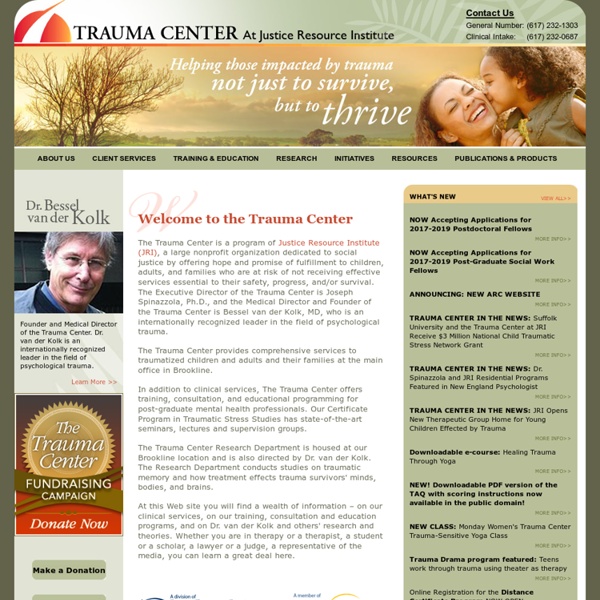



Wat is EMDR? – EMDR Welke voorbereidingen zijn nodig? EMDR werkt vaak snel. Daarnaast kan het ook een intensieve therapie zijn. Hoe gaat EMDR in zijn werk? De therapeut zal vragen aan de gebeurtenis terug te denken, inclusief de bijbehorende beelden, gedachten en gevoelens. Wat zijn de te verwachten effecten? De sets zullen er langzamerhand toe leiden dat de herinnering haar kracht en emotionele lading verliest. Hoe werkt EMDR? Een verklaring voor de werkzaamheid van EMDR is dat het terugdenken aan een nare herinnering in combinatie met het maken van oogbewegingen ervoor zorgt dat het natuurlijk verwerkingssysteem wordt gestimuleerd.
NATIONAL CENTER for PTSD Home The lifelong cost of burying our traumatic experiences By Shaoni Bhattacharya Past trauma can mean not feeling fully alive in the present (Image: Stanley Greene/Noor/eyevine) The trauma caused by childhood neglect, sexual or domestic abuse and war wreaks havoc in our bodies, says Bessel van der Kolk in The Body Keeps the Score WHAT has killed more Americans since 2001 than the Afghanistan and Iraq wars? And which serious health issue is twice as likely to affect US women as breast cancer? The answer, claims psychiatrist Bessel van der Kolk, lies in what we now understand about trauma and its effects. Take his two examples. Van der Kolk draws on 30 years of experience to argue powerfully that trauma is one of the West’s most urgent public health issues. And it is not only extreme experiences that linger. “Childhood neglect can prime individuals to be on high alert, their bodies tuned to fight or flight” He makes it clear why it’s so important: help parents with their problems, deprivation or social isolation, and you help their kids.
Int. Soc. for Traumatic Stress It Didn’t Start With You: How Inherited Family Trauma Shapes Who We Are By Mark Wolynn Guest writer for Wake Up World A well-documented feature of trauma, one familiar to many, is our inability to articulate what happens to us. We not only lose our words, but something happens with our memory as well. During a traumatic incident, our thought processes become scattered and disorganized in such a way that we no longer recognize the memories as belonging to the original event. Instead, fragments of memory, dispersed as images, body sensations, and words, are stored in our unconscious and can become activated later by anything even remotely reminiscent of the original experience. Sigmund Freud identified this pattern more than one hundred years ago. Freud’s contemporary Carl Jung also believed that what remains unconscious does not dissolve, but rather resurfaces in our lives as fate or fortune. Recent advances in imaging technology have allowed researchers to unravel the brain and bodily functions that “misfire” or break down during overwhelming episodes.
ATSS The Biggest Cause of Anxiety and Depression is Traumatic Life Events By Dr. Joseph Mercola Guest writer for Wake Up World It’s estimated that 1 in 10 U.S. adults struggle with depression [1] and another 40 million have anxiety. There’s no doubt that both of these mental health conditions are at epidemic proportions, but the unanswered question remains why? Traumatic Life Events at the Root of Many Cases of Anxiety and Depression A recent study set out to determine what role familial risk, social circumstances and life events have on mental health, using surveys completed by nearly 33,000 people as their key form of data.[3] They revealed that the single biggest determinant of chronic anxiety and depression was traumatic life events, followed by to a lesser extent, family history of mental illness, income and education levels, relationship status and other social factors. This is key, as it means that you are not powerless against depression and anxiety. For more on this, please see: Overcoming Negative Thinking – The #1 Cause of Chronic Depression.
Trauma Information Pages * Comprehensive Resources on Traumatic-Stress, PTSD & Dissociation Sexual Violence Might Reshape the Female Brain “My independence, natural joy, gentleness and steady lifestyle I had been enjoying became distorted beyond recognition. I became closed off, angry, self-deprecating, tired, irritable, empty.” These chilling words, penned in a letter that a woman known only as “Emily Doe” read aloud in June to her attacker, former Stanford University student Brock Turner, offer a mere glimpse into the emotional devastation left by her rape. For Doe and others among the estimated one in three women who experience sexual violence, the damage can ripple throughout a lifetime. But sexual violence may leave more than just emotional scars: New research suggests sexual violence may change victims’ brains. A recent study published in Scientific Reports found that sexual aggression from older male rats not only boosted the production of stress hormones in pubescent females, but it also disrupted their ability to learn various behaviors, including those needed to care for offspring.
Is your Birth Experience still affecting you Today? Just as a seed contains the blueprint for the life of a plant, the creation story of a human has a profound influence on their life. According to the father of Transpersonal Psychology, Stanislav Grof you are probably more effected by your birth experience than you realize. Grof’s perspective is supported by leading research in the field of pre and perinatal psychology. There is a biological matrix of emotional imprints and patterns that can often be traced back to your very emergence into this world. Grof refers to these as Basic Perinatal Matrices (BPM), and understanding them can reveal a whole lot about you as well as providing a great framework for releasing old patterns, healing, and personal growth. Birth experience Healing is a personal journey that we undertake as individuals but the patterns we are healing are often intergenerational, stretching back to before we were born. Founder of Transpersonal Psychology Stanislav Grof Four Basic Perinatal Matrices In the womb Stanislav Grov